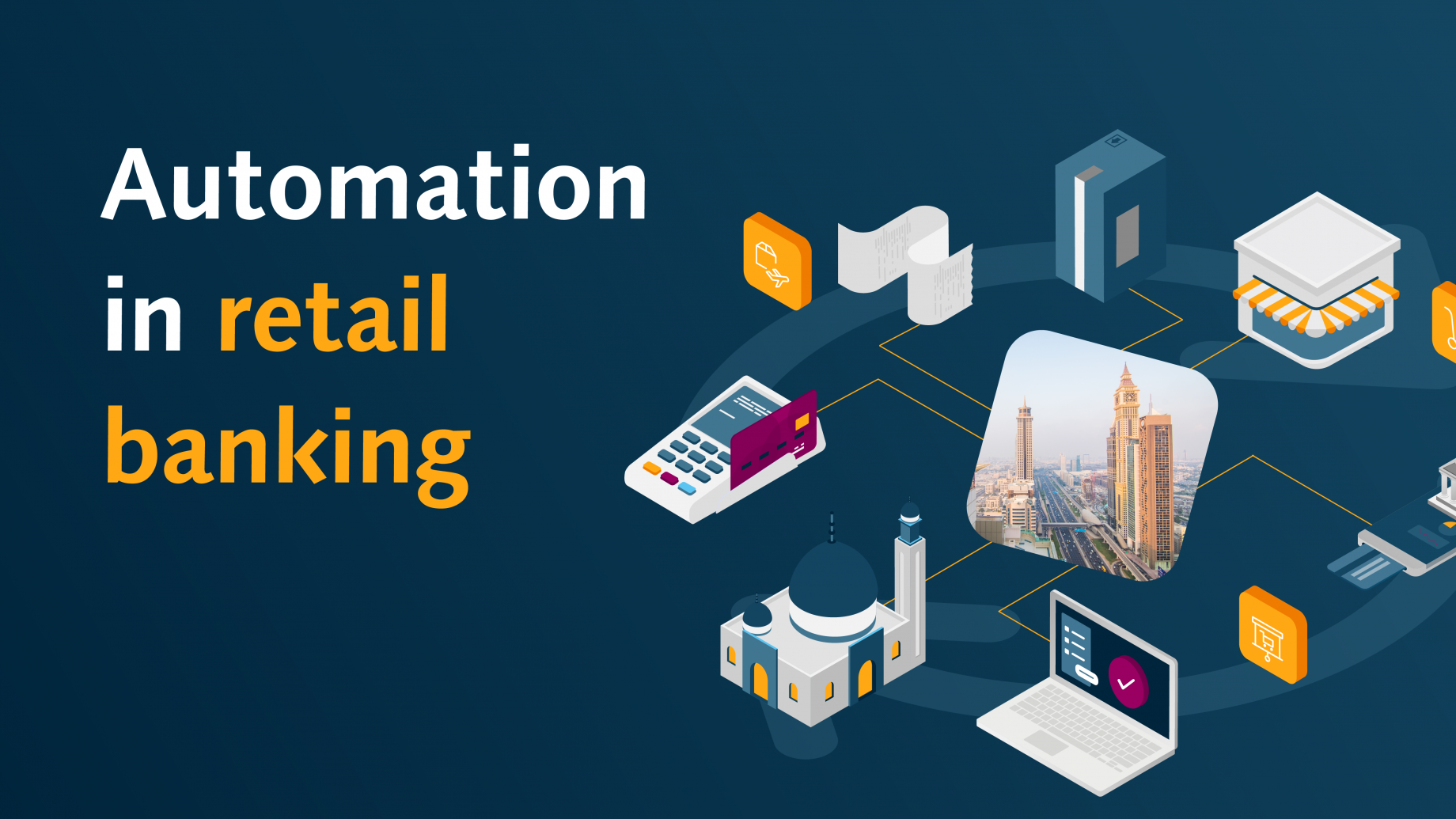
Banking in the Middle East, especially in emerging markets like Saudi Arabia, faces fierce competition and sky-high customer expectations. Financial institutions are adopting advanced technologies like artificial intelligence and process automation to meet these demands.
Market demands are pushing financial institutions to innovate fast, with automation becoming a key strategy to meet evolving customer needs. The MENA H1 2023 Banking Report highlights how AI, open banking, and tokenisation accelerate change and introduce significant opportunities in the region's financial services industry.
Middle Eastern banks are embracing these innovations, so they're at the forefront of banking automation. To ensure successful implementation and maintain a competitive edge in this rapidly evolving landscape, we'll explore how retail banking automation is transforming the Middle East's financial services industry, its key benefits and challenges.
What are the benefits of retail banking automation?
Adopting retail banking automation in Saudi Arabia fundamentally alters how banks operate and serve their customers. Here are the advantages:
- Operational efficiency: automation reduces the time and resources required for routine banking operations. Automating data entry, transaction processing, and compliance checks helps Saudi banks achieve higher efficiency, reduce errors, and lower costs.
- Improved customer satisfaction: banking automation empowers Saudi financial institutions to surpass customer expectations. Faster, more reliable services through chatbots and AI-driven assistants offer 24/7 support, resolving inquiries promptly and enhancing overall service quality.
- Meeting market demands: automation enables Saudi banks to swiftly adapt to changing market demands, such as the need for instant digital services, seamless omnichannel experiences, and innovative financial products.
- Fraud prevention and compliance: automation tools help Saudi banks manage compliance in the heavily regulated industry. These tools monitor transactions for suspicious activity and ensure operations align with regulations, mitigating risks and avoiding fines or reputational damage.
- Cost savings: banking automation reduces operational costs by streamlining processes and minimizing manual intervention. To improve offerings, Saudi banks can reinvest these savings in product development or customer service enhancements.
- Competitive advantage: Saudi banks' early adoption of banking automation propels them ahead. Offering faster, more reliable services and innovative products helps attract and retain customers, securing a competitive edge.
Challenges of retail banking automation
As Saudi banks embrace automation to enhance operations and customer service, they encounter several challenges:
- Aligning with business strategy: ensuring banking automation initiatives align with the bank's overall business strategy is challenging. Companies should thoughtfully integrate automation to enhance customer service, improve efficiency, and drive growth.
- Cultural and organizational change: adapting to automation requires a lot of cultural and organizational change. Employees may resist because they're afraid of losing their jobs. It's up to banks to manage these changes, train staff, and communicate the benefits of automation.
- Integration with existing systems: many Saudi banks still use legacy systems that aren't easy to integrate. It's hard to overcome technical challenges and integrate systems seamlessly without disrupting existing operations, which often requires significant investments.
Types of automation in retail banking
Saudi Arabian banks are adopting various types of banking automation to reshape operations, enhance customer experiences, and drive efficiency, signaling a transformative shift in the sector. Here are the different automation technologies reshaping retail banking in the Kingdom:
Robotic Process Automation (RPA)
Basic rule-driven RPA follows preset instructions to automate tasks without variation, like logging into accounts, moving files, and logging out. A more advanced RPA system handles more complex processes, adapts to different scenarios, and makes predefined decisions.
Banks in Saudi Arabia use RPA to automate repetitive tasks. It uses software robots, or bots, to log into applications, enter data, and move information around.
The global RPA market, valued at $1.57 billion in 2020, is projected to grow at a CAGR of 32.8% from 2021 to 2028. Gartner reports that 80% of financial sector leaders already use RPA for various purposes.
RPA speeds up operations and allows human employees to focus on more complex, value-added activities. Intelligent automation offers the potential to double the economy of the Kingdom of Saudi Arabia (KSA) to $1.6 trillion and add $293 billion by 2030. RPA adoption in retail banking will revolutionize the industry, driving efficiency and cost savings.
Artificial Intelligence (AI) and Machine Learning (ML)
Analysts project AI to contribute $135 billion to the Saudi economy by 2030, with the banking sector positioned to reap significant benefits. AI and ML are revolutionizing how banks in Saudi Arabia interact with their customers, offering personalised experiences through data analysis and predictive modeling.
From chatbots that handle customer inquiries to algorithms that detect fraudulent activities, AI solutions enhance banking automation's efficiency and security. Biometrics and computer vision technologies swiftly authenticate user identities and streamline document processing.
McKinsey predicts AI's potential in banking and finance could reach $1 trillion. The Cambridge Centre of Alternative Finance reports that 85% of financial services providers use AI. Banking automation uses AI and ML to bolster data privacy and security while improving operational efficiency.
While some may argue it's prudent to wait for cheaper, more advanced AI models, the technology is ready for use at scale and relatively affordable. Mid-sized models such as GPT-4, Google Bison, and Anthropic Claude Instant offer an excellent cost-effectiveness trade-off for various banking tasks.
Digital Process Automation (DPA)
Saudi Arabia, the Middle East's largest economy, strives to diversify from oil exports and become a digital leader through Vision 2030. DPA uses low-code development tools to automate processes spanning multiple applications, focusing on tasks that typically require human interaction. DPA extends beyond simple task automation to streamline complex business processes in banking automation.
Integrating various systems and data sources, DPA ensures that workflows across banking operations are as efficient and seamless as possible.
Loan and credit approval processes benefit greatly from DPA in banking automation. DPA automates once time-consuming manual tasks like gathering documentation and assessing client creditworthiness, boosting efficiency and accuracy.
Personalised banking services
Using AI and machine learning, Saudi banks can offer highly personalised services. With the help of huge amounts of customer data, like transaction history, spending patterns, and life events, banks can create tailored product recommendations, personalised financial advice, and personalised user experiences.
AI-powered algorithms can suggest investment options based on a customer's risk profile and financial goals or offer personalised savings plans. This enhances customer satisfaction and increases loyalty, giving Saudi banks a competitive edge.
Future trends of retail banking automation in Saudi Arabia
Industry trends are driving the radical transformation of the Saudi banking sector. Here are some developments to watch out for in 2024 and beyond:
- Hyper-personalisation: banking automation will leverage advanced customer data analytics to deliver hyper-personalised experiences, tailoring products and services to individual needs and preferences and redefining customer engagement and loyalty in the Saudi market.
- Focus on financial wellness: AI-powered tools will proactively guide customers toward financial literacy and responsible money management, promoting overall financial well-being. Gamification techniques will make these initiatives more engaging and interactive for Saudi consumers.
- Enhanced risk management with explainable AI: as banking automation evolves, explainable AI will help detect and prevent sophisticated financial crimes, further safeguard the Saudi banking sector, and increase transparency and trust among customers and regulators.
- Open banking and API integration: Saudi Arabia's adoption of open banking and API integration will accelerate. These technologies will enable seamless collaboration between banks, fintech firms, and other service providers, fostering innovation, competition, and improved customer experiences in retail banking.
Saudi banks must act now
Financial automation shows Saudi Arabia's commitment to technological advancement and economic diversification. Its plan for the future includes investing in digital infrastructure, encouraging regulatory reforms, and fostering innovation.
CREALOGIX Conversational AI combines artificial intelligence and automation with next-generation digital personalised customer communications. The scalable solution includes simple chat conversations and complex process handling via AI-based personal virtual assistants, enabling intelligent, real-time customer interactions.
Integrating these capabilities allows customers and prospects to interact more efficiently with financial institutions. CREALOGIX Conversational AI delivers impressive results, including a 20% reduction in call length and a 95% increase in sales volume.
Contact us today to learn how our cutting-edge solutions can transform your financial institution and help you achieve your goals.




